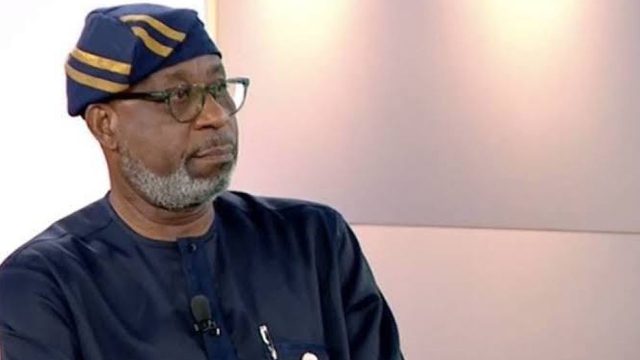This legislation on Solid Minerals represents a turning point for our nation’s mineral wealth and vast mineral resources that have remained largely untapped, and undeservedly overshadowed by our reliance on oil.

The House of Representatives Committee on Solid Minerals is proposing 5 percent of the revenue of all minerals mined to be retained by the host communities (hostcom) due to the informality of the sector.
This proposal was made known by Rep. Jonathan Gbefwi (SDP, Nasarawa), Chairman House Committee on Solid Minerals at a Public Policy Dialogue held in Abuja on Monday.
The piece of legislation titled, “Nigerian Minerals and Mining Act (Amendment) Bill” is sponsored by Rep Jonathan Gbefwi and Rep. Benjamin Kalu (APC, Abia).
The Chairman also noted that the Bill when passed will allow for the formalisation between the State and Federal government to work together to harness the benefits in the sector.
“The primary bill repeals and reenacts the principal Nigeria Minerals and Mining Act 2007 by reworking a structure based on the priority areas. Security is one of the key factors to the stalemate of the Solid Minerals sector, most of the challenges presented in a sector, or the issues contributing to prolonging the deadlock in the sector,” he said.
“Establishing Mines Inspection and Environmental Agency provides improved deeper oversight of mining activities. The agency will have offices in every State to assist with reporting and oversight. We further identified one of the lapses in security is lack of coordination between the federal and State governments.”
He continued, “The establishment bill for a Solid Minerals Development Company, which allocates 75% ownership to the private sector and 25% to the federation of Nigeria out of which 25% boost to the public breakdown is our recommendation, and we hope that you help us solidify the bill.
“To close the gap between federal and State governments, the bill further empowers the Mineral Resources and Environmental Management Committee (MIREMCO) to enable effective and joint oversight of the sector. It is clear that MIREMCO is poorly funded and lacks the resources it needs to support its activities. The Bill hopes to use MIREMCO as the facilitating tool for the government to work with State governments to secure their needs to ensure formalisation of the sector.
“Community Development and the Environment are really prioritised in the bill. The Petroleum Industry Act (PIA) sets aside 3% of their annual operational expenditure to host communities. In the Bill, we have set aside 5% of the revenue of all minerals mined to the host communities, and this is due to the informality of the sector. We believe that it can be reviewed and improved through this programme.
“We also incorporated more efficient policies to enforce the environmental remediation fund to ensure that host communities are not left with deplorable sites and that the environment is adequately protected and restored after mining activities.”
He also informed that the “Public Policy Dialogue is a space for stakeholders to hold an integral role in the legislative process to ensure that the Bill is adoptable and implemented.”
Declaring the dialogue open, the Deputy Speaker of the House of Representatives, Rep. Kalu said the solid mineral is one key area capable of optimising the promising prospects of Nigeria’s mining sector.
“This public policy dialogue is engineered to create the appropriate right of way for the necessary adjustments and policymaking creativity that is required to optimize the promising prospects of Nigeria’s mining sector. While governments hold many of the levers to deal with the great challenges of our time, businesses have the innovation, the technology, and the talents to deliver the solutions we need.
“It is through this crucial partnership that we can unlock the true potential of Nigeria’s mining sector, not just for economic growth, but for sustainable development and shared prosperity. Thus, I am convinced that the governing philosophy in the mining sector in Nigeria should henceforth be approached with a private-sector-led lens. Today, I stand before you not only as Deputy Speaker of the House of Representatives but also as a co-sponsor of the HB.751: Nigerian Minerals and Mining Act (Amendment) Bill so ably sponsored by Honourable Jonathan Gbefwi.
“This legislation, if passed, will represent a turning point for our nation’s mineral wealth. I am also convinced that Nigeria’s vast mineral resources have remained largely untapped, and undeservedly overshadowed by our reliance on oil. Despite boasting over 40 commercially viable minerals, the mining sector contributes a mere 0.3% to our GDP. This, my friends, is unacceptable. Our duty call today is to turn the tide. There are indications of a renewed vigor in our mining industry, fueled by a collective will to diversify our economy, create jobs, and unlock the immense potential that lies beneath our soil.
“The 2016-2025 mining industry development roadmap, aiming to increase the sector’s GDP contribution to 3% by 2025, is already showing progress. Projects like the Segilola Gold Project in Osun state governed by a private-sector-led lens are injecting millions of dollars into our economy and attracting much-needed investment.”
The Deputy Speaker also said the mining sector is capable of attracting forex that will boost the country’s economy.
“To demonstrate this concisely, in the 3rd quarter of 2023, the Segilola Gold mine in Osun state, Nigeria’s first industrial-scale gold mine posted $118 million in revenue for its owners, Thor Explorations Limited after reporting $71.7 million in earnings before interest, taxes, depreciation, and amortization (EBITDA) in 2022 according to its publicly available financial statements for 2022 and 2023.
“Initiatives like the simplification of licensing and competitive royalty regimes attract global players like Thor Explorations, showcasing the potential for an industrial-scale mining sector. We have done it with gold mining in Osun state, we can replicate it across all the states of the federation and the value chains of 40 other commercially viable solid minerals that abound in the country.”
Meanwhile, he said the challenges remain insecurity, inadequate infrastructure, and a lack of skilled labor which continue to act as bottlenecks.
